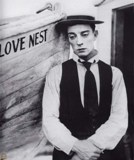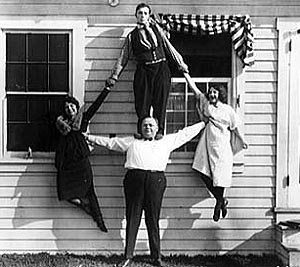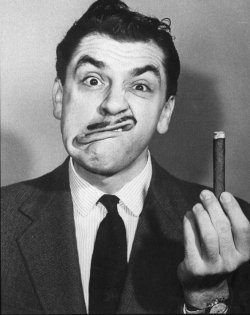There are a few composer performers who are have associated themselves with silent film greats and other great iconic comedians. The first grouping I want to point out is Bill Frisell and Buster Keaton.
Then there’s Don Byron and Ernie Kovacs.
And, there’s Dave Douglas and Roscoe “Fatty” Arbuckle.
There are others, most notably composers who have written new scores to major silent films, such as Richard Einhorn’s Voices of Light: The Passion of Joan of Arc, which is a opera/oratorio Einhorn composed for Carl Dryer’s 1927 silent film. Then you have Carl Davis, whom in addition to a large body of film score compositions, was commissioned to write new scores for a number of Harold Lloyd masterpieces.
 For today, we’re going to stick with the category of comedy, primarily from the silent period.
For today, we’re going to stick with the category of comedy, primarily from the silent period.
Okay, first let me ask, do you know any of these artists? Kovacs? Keaton? Arbuckle? Douglas? Frisell? Byron?
Most people who have any interest in cinema know Buster Keaton. He is one of a group of great masters of silent film comedy that includes names long faded away from the consciousness of all but the most die hard fans of silent films: Charley Chase, Roscoe Arbuckle, and Harry Langdon. The very top of the silent film pyramid consists of Charlie Chaplin, Buster Keaton, and Harold Lloyd.
They are all great, truly, truly great. And I love them all. Do I have a favorite?
Well, I guess it would have to be Buster.
 Recently, on Studio 360, Kurt Andersen interviewed guitarist and composer Bill Frisell about the DVD release of three Buster Keaton masterpieces set to original music by Frisell. You see, Frisell has a history with Keaton, having created a number of pieces set to the films of Keaton, but never actually paired together in a DVD. So, yes, you could listen to the music, but not actually watch the movie with Frisell’s composition as the soundtrack. Now, thankfully, there are three Keaton classics available as for the first time, each with a Frisell soundtrack.
Recently, on Studio 360, Kurt Andersen interviewed guitarist and composer Bill Frisell about the DVD release of three Buster Keaton masterpieces set to original music by Frisell. You see, Frisell has a history with Keaton, having created a number of pieces set to the films of Keaton, but never actually paired together in a DVD. So, yes, you could listen to the music, but not actually watch the movie with Frisell’s composition as the soundtrack. Now, thankfully, there are three Keaton classics available as for the first time, each with a Frisell soundtrack.
If you don’t know either artist all that well, this is a great opportunity to connect with two of America’s best. Frisell is a brilliant composer, guitarist, and musical citizen. His work runs the gamut from experimental, to straight up jazz, folk, rock, world music, and more. His output is remarkable in terms of amount, but more important in terms of quality. His commitment to music and musicians never ceases to amaze.
For Keaton fans, this is particularly good news, as the state of the art Keaton DVD’s come from the company Kino, and somewhere along the line, somehow, they commissioned the Alloy Orchestra to create original music for the Keaton discs. I am sorry to stay that I hate the Alloy Orchestra’s Keaton scores. For me, well, the scores just don’t fit what’s happening on screen. I tend to turn the sound off when watching those DVDs.
So, pairing Frisell’s music to Keaton for the first time on DVD is a blessing.
What I love about Keaton, the thing that distinguishes him from Chaplin, Lloyd, and the other greats, is his mix of humor, pathos, and absurdity; in other words the very broad palette of human conditions that he paints with in a manner that is highly experimental. He pushed the early technology to its very limits. If you want to see what I mean, watch Sherlock Jr., to witness his character walk down the aisle of a movie theater, right straight through the screen and directly into the movie being projected. Many years later this was paid tribute to by directors such as Woody Allen (The Purple Rose of Cairo) and Giuseppe Tornatore (Cinema Paradiso).
How about the other two pairings?
Dave Douglas and Fatty Arbuckle: Keystone was one of Dave’s first releases Greenleaf, his own label . It’s an interesting choice, as Arbuckle is probably the most misunderstood and overlooked of the silent film comedy greats. A mentor to Chaplin, as well as the person who gave Buster Keaton his break in film, Arbuckle’s work has been overshadowed for well over a half century by a scandal that ruined his name and career. A few years ago, The Forgotten Films of Roscoe Fatty Arbuckle was released on DVD. This set was the first on DVD to really help restate the importance and place of Arbuckle in film. I am sorry to say that it is already out of print.
 Dave Douglas’s recording Keystone includes both CD and DVD, and features Fatty and Mable Adrift, accompanied by original music composed and performed by Douglas and ensemble, including a DJ and a Wurlitzer organ. And of course, Keystone refers to the Keystone cops and the Keystone movie studio of pioneer Mack Sennett, in case you missed the reference.
Dave Douglas’s recording Keystone includes both CD and DVD, and features Fatty and Mable Adrift, accompanied by original music composed and performed by Douglas and ensemble, including a DJ and a Wurlitzer organ. And of course, Keystone refers to the Keystone cops and the Keystone movie studio of pioneer Mack Sennett, in case you missed the reference.
In many ways Dave Douglas is cast from a similar mold as Frisell. His range of interest in music and the musicians he works with are remarkable. He’s another artist who has a deep commitment to a community of artists. Check out Spirit Moves, released in mid-2009 made a whole host of the jazz top ten lists for the year.
Also check out Dave’s most recent release, which is another case in point for the range of artists he associates with. A Single Sky pairs Douglas with Jim McNeely and the Frankfurt Radio Big Band. McNeely, long associated with the Vanguard Jazz Orchestra is one of the most interesting composer/arrangers out there working with big band. He’s no slouch as a pianist either. LOL!
I do also want to point out the Festival of New Trumpet Music that Dave co-founded along with two other great trumpet players: Roy Campbell, Jr., and Jon Nelson. This festival, which is an organization run by and for musicians, is kicking off its 2010 program next week.
Finally, there’s Don Byron and Ernie Kovacs. What a tremendous pairing. On A Ballad for Many, Byron composes a score to a 1957 Kovacs television special containing no spoken words: Silent Show. 
The back story to Silent Show tells much of what you want to know about Kovacs. In a nutshell, after just having splitting up with his partner Dean Martin, at a peak period of popularity, Jerry Lewis is offered a 90 minute TV special. He decides to only do 60 minutes. NBC casts about looking for someone to fill the open 30 minute slot. No one wanted it, for they we afraid to follow Jerry Lewis.
In steps Kovacs, who gets the blessing for a 30 minute near silent program (except for music and sound effects) that establishes Kovacs’s genius for all time. If there’s a TV artist whom you would link with Buster Keaton, well, without a doubt it would have to be Ernie Kovacs.
As for Don Byron, he’s a master musician who has associated himself with the very widest range of styles, ideas, politics, and people imaginable. I was first blown away by his playing in the 80s, when as a member of the Klezmer Conservatory Band, he played about the best Klezmer clarinet. From there, his road winds through gospel, to funk, to straight up classical, to straight up jazz, to through composed music, to soul, to Sondheim, and so very much more. He was recently a finalist for Pulitzer Prize in music composition.
These are three master American musical artists, who have linked themselves with three master American film and television artists of the past. It would all make for quite a nice little study on the integration of the arts, don’t you think?
For a future entry, the greatest comedian of all time: W.C. Fields.




The only problem with the W.C. Fields idea is, his silent movies are nowhere near as good as his sound films. The silent stuff is deservedly obscure and much of it is actually lost; the sound films are what made his legend.
It’s true. Most of Fields’s slient films are lost. Nevertheless, his success on stage, film, radio, burlesque, serious film, as well as comedy, and more, will make for a fun blog entry somewhere down the road.